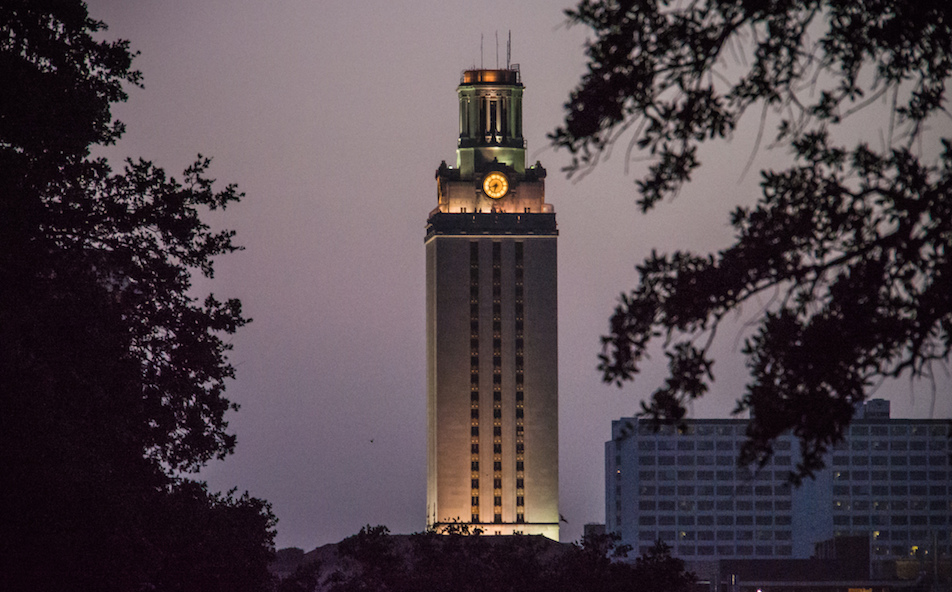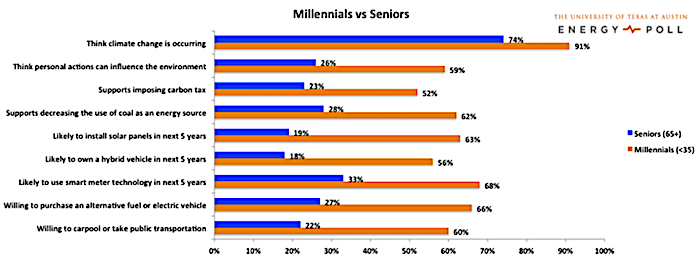By Bill Dawson
Texas Climate News
Young people are leading the way as Americans increasingly agree that climate change is occurring, according to the latest University of Texas Energy Poll.
The UT pollsters also found in their nationwide survey last month that a relatively large majority of millennials – 63 percent – say energy issues will influence the way they vote. The poll designated its youngest category of respondents, the group often called millennials, as those age 35 and younger.
“Millennials have strong feelings about energy issues, especially climate change,” UT Energy Poll director Sheril Kirshenbaum said in a statement about the survey results, which were issued today. “If they show up at the polls, they could significantly influence the outcome of this election.”
Of the two major party candidates for president, Democrat Hillary Clinton has declared climate change is a major, manmade threat to the planet and its inhabitants and has outlined various proposals to address it, including boosting renewable energy to reduce climate-disrupting carbon pollution from fossil fuels such as coal.
Republican Donald Trump, in a particularly dramatic contrast, has dismissed human-caused climate change as a “hoax” and has pledged, among his other energy proposals, to revive the flagging U.S. coal industry, a leading source of carbon emissions.
Ninety-one percent of respondents 35 and younger said climate change is occurring, the UT pollsters found. That’s a notably more than the 74 percent of senior respondents (those 65 and older) who said it’s happening. Seventy-nine percent of all poll participants said climate change is occurring – the highest percentage to give that answer since the UT poll began posing the question in Spring 2012.
A sizable political divide between millennials and seniors was evident in the latest UT survey on various climate and related energy policy issues.
On the question of whether coal’s use as a power source should be decreased, 62 percent of 35-and-younger respondents said yes, compared to only 28 percent of those 65 and older.
Regarding the possible implementation of a so-called carbon tax on fossil-fuel use to reduce carbon dioxide pollution – an idea favored by many climate-action activists, plus others including Exxon Mobil – 52 percent of millennials were in favor, compared to 23 percent of seniors.
Two-thirds of millennials (66 percent) told the UT pollsters they were likely to buy an electric or alternative-fuel vehicle in the next five years. Only slightly more than a quarter of seniors (27 percent) said the same thing.
Compared to the nearly two-thirds (63 percent) of millennials saying energy issues will affect how they vote on Nov. 8, just over a third (34 percent) of seniors said those issues would influence their decisions at the polls.
The vast majority of climate scientists agree that pollution from human activities is heating up the atmosphere and causing other climate disruptions.
On the basic question of whether climate change is occurring, whatever the cause, the 79 percent of all respondents who agreed with that statement in the latest UT poll represented a six-point jump from 73 percent who said they think it’s happening in the previous UT survey, conducted earlier this year.
Likewise, the group who said climate change is not occurring in the September poll – 12 percent of all survey respondents – was the smallest percentage to agree with that statement in the history of the twice-a-year UT Energy Poll, a decline from 16 percent earlier this year. In Spring 2012, the first time the question was asked in the university’s poll, 65 percent said the climate was changing, while 22 percent said it was not.
“The percentage of Americans who say global climate change is happening continues to rise, including clear majorities of both major political parties,” Kirshenbaum said.
On the question of what’s causing climate change, a substantial majority of all poll respondents in the latest UT survey (77 percent) said it is at least partly a result of human activities. The world’s leading scientific body on the subject, the Intergovernmental Panel on Climate Change (IPCC), has concluded it is “extremely likely” that human influence has been the major cause of the planet’s average atmospheric warming since the mid-20th century.
The latest UT poll responses on causation broke down like this: Forty-six percent agreed with the IPCC conclusion that the earth’s rising average temperature is “mostly due” to human actions. Thirty-one percent said it is “equally due to humans and natural forces.” Seventeen percent said it’s “mostly due to natural forces.” The rest didn’t know or had no opinion.
Despite broad agreement on the core question of whether climate change is occurring at all, the UT pollsters found major differences on key energy-policy questions, depending on respondents’ party affiliation or which presidential candidate they favor.
On the central climate-energy issue of reducing carbon emissions, 76 percent of self-described Democrats were in favor, in contrast to 48 percent of Republicans.
Sixty-three percent of Clinton supporters wanted to decrease U.S. use of coal. A much smaller portion of Trump voters – 30 percent – agreed that coal use should decline.
An even bigger gap divided the respondents on the question of a carbon tax. Fifty-seven percent of Clinton voters were in favor, compared to 21 percent of Trump backers.
Kirshenbaum commented: “Some of these findings reflect entrenched positions of the two parties. But it’s worth noting that nearly a majority of Republicans, along with 76 percent of Democrats, support steps to reduce carbon emissions.”
Among his other climate-energy pronouncements, Trump has promised to rescind U.S. participation in the landmark international climate accord reached last December in Paris. Nearly 200 nations made varying pledges to reduce carbon emissions and transition away from fossil fuels over the next few decades. Clinton supports the Paris agreement.
In a related question, which was not explicitly framed in the context of the presidential race, the UT poll asked which of a number of statements best reflects respondents’ opinion about the proper global role the U.S. should take on climate change. The results:
- 37 percent: “Climate change is an urgent threat and all countries need to take action equally.”
- 24 percent: “Because the U.S. is a global leader, it should set an example by doing more than other nations.”
- 9 percent: “The U.S. has a moral obligation to act and should do more than other nations.”
- 9 percent: “Because the U.S. has contributed disproportionately more emissions, it should do more than other nations.”
- 5 percent: “The U.S. should do nothing.”
- 16 percent: No opinion or other.
The UT Energy Poll was developed by the university’s McCombs School of Business. The poll was launched in October 2011.
+++++
Bill Dawson is the founder and editor of Texas Climate News. Disclosure: He received a degree from the University of Texas some good long while ago.
Image credits: Photo – Bill Oriani / Flickr (slightly cropped and used under a Creative Commons license); chart – University of Texas Energy Poll.


